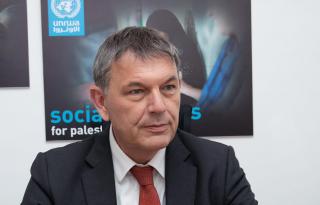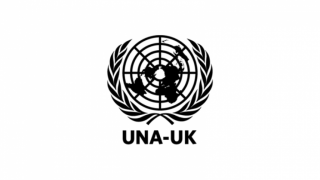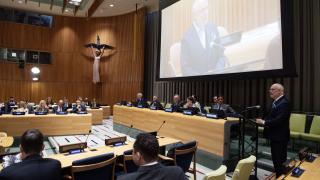
The United Nations Relief and Works Agency for Palestine Refugees in the Near East (UNRWA) was established by the UN General Assembly in 1949, following the 1948 Arab-Israeli conflict, to carry out direct relief and works programmes for Palestine refugees.
When the Agency began operations, it was responding to the needs of about 750,000 Palestine refugees. Today, 5.6 million Palestine refugees are eligible for UNRWA services. The General Assembly has repeatedly renewed UNRWA's mandate, most recently extending it until 30 June 2023.
Following his recent mission visit to the UK, we spoke with UNRWA Commissioner-General Philippe Lazzarini about the Agency's work, the challenges the agency faces, and how the UK can help.
UNRWA provides assistance and protection for registered Palestine refugees, some of the world’s most vulnerable people. Can you tell us more about this work?
UNRWA's services encompass education for more than half a million girls and boys, health care, relief and social services. Through these services, the Agency has contributed to some of the most successful human development stories in the region: from educating over two million Palestine refugee girls and boys, to universal infant vaccination and reduced maternal mortality and much more. According to external credible validators like the British Council, the World Bank, UNHCR, and MOPAN, our education and health programs are not only great value for money but have also a huge positive impact on the lives of the refugees.
Despite the challenging context in which UNRWA operates, the Agency is fully committed to teaching excellence. One example of our outstanding achievers includes an award winning graduate from UNRWA Gaza Training centre (GTC) who currently works as a photovoltaics consultant for German aid organisation GIZ. She recently shared her experience as one of Gaza’s first female technicians in renewable energy at the Global State of Human Rights Conference in Venice, Italy.
UNRWA is funded almost entirely by voluntary contributions from UN Member States, and the agency is currently facing a shortfall of $100 million. Last month you told the Advisory Commission on UNRWA that the Agency’s funding model is unsustainable, and that reserves are depleted. What is the future of UNRWA if this funding gap continues?
UNRWA’s financial challenges could lead to the slow erosion of the quality of our services or to their interruption. Imagine the consequences of stopping basic education for kids and youth, or ending health care and social services for the most vulnerable. In practical terms, this has already meant delays in supplying medication to ill patients, and reduced resources to fix the roofs of schools that are cracking. Austerity measures already cause immense distress among the Palestine refugees across the region. For them, UNRWA is their lifeline. Austerity also causes distress to our local personnel - the majority of the 30,000 UNRWA staff - who fear that they may suddenly lose their livelihoods. It is important to recall that in places like Gaza, Lebanon or Syria there are no alternative sources of income. The salary of our staff often supports multiple families.
UNRWA operates and provides services in Jordan, Lebanon, Syria, the Gaza Strip and the West Bank, including East Jerusalem. What are the biggest challenges in these regions? What can the International Community do to help?
Across our five fields of operation, poverty rates amongst Palestine refugees have increased, reaching 80 per cent or more in Lebanon, Syria and Gaza. Many Palestine refugees report living with one meal a day. For the first time in decades, four out of the five areas where UNRWA operates are simultaneously in crisis. While tensions are high in the occupied West Bank, including East Jerusalem, Gaza is still struggling to recover from the impact of last year’s conflict. The conflict in Syria has now entered its 12th year with humanitarian needs at their highest since the start of the war. In Lebanon, the socio-economic collapse of the country and the sharp rise of prices of fuel and food has pushed most young Palestine refugees to think of leaving the region at any cost. Palestine refugees’ rights are enshrined in international law and UN resolutions. We need strong support from donors to stop the defunding of the Agency and avoid a humanitarian and regional security crisis. In order to stabilise the financing of UNRWA, the Agency needs sufficient, predictable and sustainable funding as part of a long-term plan.
I feel inspired by the commitment shown by UNRWA staff every day, amazing women and men who, even under the most challenging circumstances, are dedicated to protecting the dignity and interests of Palestine refugees.
You recently completed a mission visit to London, where you highlighted the need for the UK to step up support for UNRWA. UNA-UK has repeatedly called for the UK to do more to support refugees. We are concerned that the UK is stepping back from its obligations to protect and support the world’s most vulnerable people. What were the outcomes of your visit and what do you recommend the UK should do to support UNRWA?
Historically, the UK has been a strong political and financial supporter of UNRWA. Until recently, the UK was consistently amongst the top-five donors providing predictable support through multi-year funding to the Agency’s core budget, as well as consistent support to the UNRWA Emergency Appeals. However, the sharp decrease in UK Official Development Assistance (ODA) from 0.7 per cent to 0.5 per cent of GNI has affected all humanitarian and development partners, including UNRWA. While we appreciate the continued UK funding, we hope that its historic commitment to support Palestine refugees in this volatile region will allow a timely return to funding levels of those in 2019-2020.
UNA-UK is proud to have a network of members and supporters passionate about the UN and its mission. How can the UK public, including our members, support the vital work of UNRWA?
There are a variety of activities that can contribute to supporting Palestine refugees through UNRWA. From raising awareness and engaging in the discussion on UNRWA’s essential role in fulfilling the needs of Palestine refugees in the region to donating online and directly helping provide vital food and cash assistance, health care and education services to thousands of Palestine refugee families.
UN Secretary-General António Guterres has repeatedly highlighted the global impact of the war in Ukraine. How has this conflict impacted Palestine refugees? What can member states including the UK do to help minimise negative impacts?
The situation in Ukraine has exacerbated the noticeable increase in food and commodity prices, seriously affecting the household economy of Palestine refugees. In Gaza, the cost of our food basket has increased by over 40 per cent compared to the average last year. This year UNRWA has a funding gap of US$ 72 million to sustain the food pipeline beyond quarter three for over one million Palestine refugees. We also urgently need US$ 48 million to maintain emergency food and cash assistance to Palestine refugees in Syria, Lebanon and Jordan. I have repeatedly appealed to all donors to ensure that Palestine refugees are not a collateral of the events in Ukraine. I have asked donors that reduced funding, including the UK, to reconsider the impact of their decision on the region’s stability. I call on them, once again, to provide funds that match the annual costs of running UNRWA services and ensure that the Agency’s mandate is fulfilled.
Finally, what have you learned as UNRWA Commissioner-General about compassionate refugee response?
Besides sufficient and appropriate attention to their basic needs, Palestine refugees, who are one of the most vulnerable communities in the world, deserve dignity, respect, and kindness. I believe we must work with and for these communities through engaging in dialogue such as a participatory approach to camp improvement which has led to great improvements in addressing the deteriorating living conditions in Palestine refugee camps. In the implementation of all its operations, from schools to health centres and food distribution centres, UNRWA promotes a supportive and respectful environment. Identifying barriers encountered and training staff in order to overcome them is crucial to ensure refugees’ wellbeing. I feel inspired by the commitment shown by UNRWA staff every day, amazing women and men who, even under the most challenging circumstances, are dedicated to protecting the dignity and interests of Palestine refugees.
Photo: Philippe Lazzarini. Credit: UNRWA






